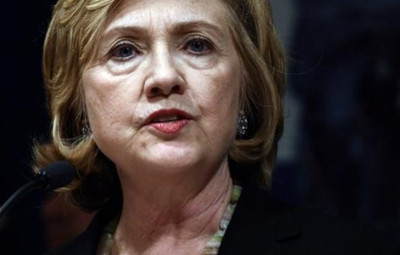Hillary Clinton's e-mails
希拉里·克林頓的電子郵件
Nothing to hide?
毫不隱瞞?
A hoo-hah about transparency
對透明度的破壞
AS SCANDALS involving people called “Clinton” go, it seems a bit tame. On March 2nd theNew York Times revealed that when Hillary Clinton was secretary of state, she used a personal e-mail account rather than a government one for all her official business. This stumble reveals a more general problem with Mrs Clinton's undeclared presidential campaign.
圍繞著“克林頓”家族的流言蜚語頻頻流出,一切看似略微無聊。3月2日,《紐約時報》文章披露希拉里·克林頓時任國務卿之際,曾使用個人郵箱賬號(而非政府郵箱賬號)處理她所有公務 。對于克林頓夫人未申報的總統競選而言,這一紕漏引發了一個更加普遍問題。

The finding came through the Republican-controlled House Select Committee on Benghazi. (House Republicans have spent two years hunting fruitlessly for proof that, for political reasons, American missions in Libya were left vulnerable when they were attacked in 2012.) Federal rules require all e-mails sent for government business to be stored by departments. Mrs Clinton's evidently were not. They were in fact stored on a personal server set up in her home in Chappaqua, New York. That looks suspicious: because only Mrs Clinton possesses physical access to her e-mails, she can be selective about which ones she turns over.
這個調查結果是由共和黨控制的班加西眾議院特別委員會發現。(因政治原因2012年美國遭遇襲擊,其在利比亞的任務瀕臨瓦解;為了證實,眾議院共和黨人花了兩年時間找出證據,結果一無所獲。)聯邦訴訟規則要求所有與政府公務相關的郵件必須由各部門存檔。顯然,克林頓夫人的郵件是一個例外。實際上,那些郵件保存一個個人服務器上,該服務器安置在其紐約的查帕奎家中。這不禁引人猜疑:因為只有克林頓夫人才有權限查看這些郵件,而且她想誰看這些郵件誰就可以看。
For Republicans, the finding is politically convenient. The investigation into Benghazi had all but died for lack of anything interesting to say. The idea that Mrs Clinton may have kept back e-mails could help to revive the allegations. Trey Gowdy, the chairman of the investigative committee, quickly called for all Mrs Clinton's communications to be made available for his committee to scrutinise; on March 4th a subpoena was duly issued.
對共和黨人而言,這個發現有利于政途。調查班加西(利比亞北部港口城市)的行動,險些因缺少猛料可爆而終止。對克林頓夫人可能存檔郵件的猜想將有助指控生效。調查委員會主席Trey Gowdy立刻要求克林頓夫人提供其所有通信記錄,以便調查。3月4日,法院傳票正式發出。
For Mrs Clinton, the story could prove a lasting headache. It fits into a pattern of cloudy dealings. Republicans were already complaining about the Clinton Foundation, a charity controlled by Mrs Clinton and her husband Bill, for accepting donations from foreign governments, including some while she served at the State Department, which could raise conflicts of interest. The foundation does plenty of charitable work, but it also helps to provide a platform for Mrs Clinton to do things that look a lot like campaigning.
對克林頓夫人而言,這個紕漏極可能是一個“頑疾”。因為合乎多云交易的模式。共和黨人已經對“克林頓基金”表示不滿(該基金會由克林頓夫人和她丈夫比爾管理,接受國外政府的捐贈包括其在國務院任職時的捐贈,其中一些還涉及利益沖突)。“克林頓基金”不僅籌辦大量慈善活動,而且為克林頓夫人搭建競選平臺助力。
Few think that such murkiness will be cleared up by better control of e-mails, however. Politicians who want to conceal shady dealings have plenty of other ways to communicate. They can meet in person or use intermediaries. Some might simply use more private electronic systems. A Snapchat message disappears after a few seconds. Does the Freedom of Information Act cover that?
然而,諸如此類的“負面形象”很難通過加強郵件管理而得到改善。想要掩蓋骯臟交易的政客們還有許多其他方式通信。他們可以暗地里見面,抑或通過中間人。有些政客僅僅使用更加私人的電子系統。“閱后即焚”(Snapchat)上的信息幾秒鐘后就會消失。《信息自由法》適用那款軟件嗎?譯者:黃柳












